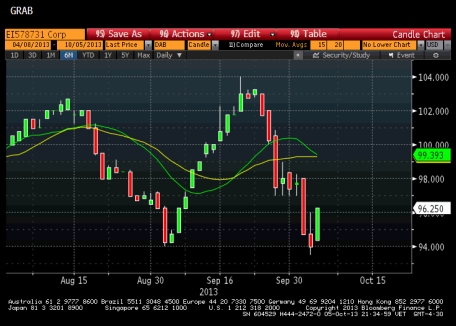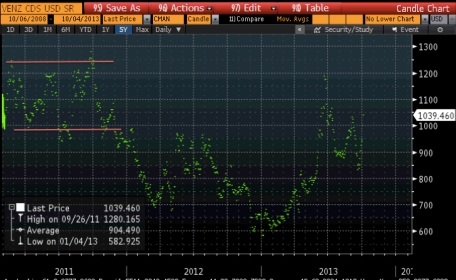Venezuelan and PDVSA bonds have not done well lately. While there was a nice rally in September, up to the US Federal Reserve announcing that it was not ready to reduce tapering, after that, they did not well, with a bounce on Friday due mostly to JP Morgan reiterating its overweight rating on the bonds,in a report entitled something something like “Venezuela: Bending, but not Breaking.
The graph for PDVSA 2022 is shown below:
That was quite a drop, almost 10 points since September 20th., except for Friday’s bounce.
Why has this happened? Essentially all news coming out of Caracas is negative. There is nothing positive happening and Maduro has been in power almost six months and very little has been done on economic policy. In fact, there has been total policy paralysis on economic matters since April.
In April, I suggested that investors reduce their position in Venezuela and PDVSA for the simple fact that bonds had gone up because “change” was expected, but as long as Giordani remained in the Cabinet, it was difficult to envision this change.
But for foreign investors signs are even worse, everything coming out of Caracas seems to be negative:
-There is total policy paralysis
-Sidetur bonds defaulted, the first time in 14 years the Chavista Government has allowed this to happen.
-Liquid international reserves are low. There is money in parallel funds,but people don’t know how much. Is Maduro willing or commited to pay as much as Chávez?
-PDVSA has failed to increase oil production significantly. Even more ominous, Lukoil and Petronas have decide to leave the partnerships they joined recently in thePetrocarabobo and Junin 6 fields.
-A new foreign exchange system, called Sicad was set up, but has failed to deliver foreign currency. No auctions have been held in four weeks in what was supposed to be a system that would regularly offer foreign currency to companies.
-The ICSID Court ruled against Venezuela in the ConocoPhillips case, which will eventually have a financial obligation attached. Given the uncertainty over the full amount, this implies an additional financial commitment in the future for the country.
-President Maduro went to China and while he failed to obtain a US$ 5 billion loan in cash, he did extend the Heavy Chinese Venezuela fund with a US$ 5 billion loan. This loan is an extension, which will allow Venezuela to buy Chinese goods in exchange for oil, constraining PDVSA’s cash flow from oil sales.
-The non-payment for the delivery of three oil tankers raises questions as to why PDVSA is holding back payment when the amounts involved are not significant.
-Investors are increasingly concerned that the Government will have to resort to issuance in the near future, if it wants to create any form of new foreign exchange market as resources to supply this market are limited at this time.
-The Government intervened paper product maker Manpa, sending another negative signal to markets. While the intervention is supposedly temporary, President Maduro has suggested a number of irregularities were found and the intervention will be extended.
-Meanwhile, President Maduro continues to blame the private sector for inflation and shortages.
-And oil could drop further now than Iran is talking to the US Government.
But in our opinion, all that is happening is that Venezuelan bonds are sort of resetting their expectations. While I do not expect the government or PDVSA to default or restructure in the next two years, one has to think back to what happened in 2011 when Hugo Chavez got sick. At that time, bonds were trading at a spread of 1,000 to 1,200 basis points to US treasuries, as shown in the curve below:
This is a plot of the country risk since 2011, expressed in basis points. As you can see, right before Chávez got sick, the price to insure Venezuela bonds for 5 years was oscillating between 1,000 basis points (19%) and 1,200 basis points (12%). The country risk (the price paid by people to insure Venezuela against default, dropped as low as 600 basis points, as people were betting that once Hugo was gone, there would be change in the way the country was run. However, since Maduro took over over five months ago, little has happened and people are getting concerned. The spread r country risk reached 1,030 on Friday.
Some people are so concerned that they think Venezuela or PDVSA will default soon. I don’t think this is the case. However, looking at the plot above, you can see that the credit risk spread can easily (or should?) go back to 1,200 basis points. Thus, this resetting of the curve is not something I am willing to ride out. Bonds will likely have further to drop.
Thus, I am telling people to simply lighten up on their Venezuela positions. Bonds could easily drop 10 more points, something most investors would have a hard time riding out.
In fact, just as Chávez was sick because of his health, I think Cristina is politically sick in Argentina and investors will bet that things will change down there and bonds from that country will rally sharply in the next couple of years. Even if nothing changes in the end in Argentina, just like in Venezuela.



October 7, 2013 at 6:47 pm
Godgiven is not returning empty handed from Moskva
http://www.martinoticias.com/content/opiniones-alvaro-alba-busto-de-chavez-moscu-rusia/28126.html
October 7, 2013 at 4:47 pm
http://www.sabenatechnics.com/
If they don’t have her, they know who does for sure because she’s parked at their location
October 7, 2013 at 4:42 pm
If she’s at Merignac, which is a fact, then I would try Sabena technics. This is where I would start.
October 7, 2013 at 11:05 am
Can someone call Maroc Aviation and Sogerma to get the story? Kepler???
Where is the media?
October 7, 2013 at 1:43 am
FAV0001 in storage at Bordeaux–Mérignac
They probably sent her to EADS SOGERMA or Maroc Aviation for repairs that cannot be done.
AIRBUS AIRCRAFT
2013 AVERAGE LIST PRICES (mio USD)
A319 $83.6
http://www.airbus.com/presscentre/corporate-information/key-documents/?eID=dam_frontend_push&docID=14849
Average cost per flying hour: £10 000 $16 027 €11 822
October 7, 2013 at 12:42 am
Maduro is painting himself into a corner:
Maduro said he had been concerned about flying in the plane after it returned from five months of work by Airbus, and ordered his own technicians to carry out an inspection.
“After 10 or 12 days, a serious fault appeared in one of the wings of the plane. After five months at Airbus in France – my God!” Maduro said during a lived televised broadcast.
“With the help of an international law firm, we’re preparing legal actions against Airbus of France.”
Airbus was not immediately available for comment.
October 7, 2013 at 12:38 am
Maduro indicó, además, que mantuvo conversaciones con autoridades del gigante aéreo europeo Airbus para comprar 15 aviones destinados a la aerolínea estatal Conviasa y dos helicópteros con el objetivo de fortalecer “la aviación militar bolivariana”.
“Por lo menos 15 Airbus necesitamos, de acuerdo al diseño del plan que hemos hecho para el desarrollo de Conviasa”
“Hemos conversado un conjunto de helicópteros”, dijo Maduro en un consejo de ministros televisado en directo por el canal estatal Venezolana de Televisión. “Dos helicópteros, para empezar, (…) en el proceso de fortalecimiento de nuestra fuerza aérea”, agregó.
October 7, 2013 at 12:16 am
Jim mentions the presidential Airbus. Here’s the deal, Maduro met with EADS (Airbus) at Paris Air Show Le Bourget, 19 June 2013. Look at all those smiles in high res as they check out Airbus Corporate Jets. He was shopping for a new presidential bird. I’m guessing they wanted Airbus to repair the damage to FAV0001 under warranty or to provide a discount or credit towards repair or new purchase which Airbus refused. Is the “strategic alliance” with France still on?
http://goo.gl/2SQygf
October 6, 2013 at 11:48 pm
US and Venezuela: Anatomy of a diplomatic breakdown
http://www.miamiherald.com/2013/10/06/v-print/3674125/us-and-venezuela-anatomy-of-a.html
http://www.elnuevoherald.com/2013/10/06/v-print/1584491/venezuela-y-estados-unidosel-desencuentro.html
October 6, 2013 at 4:30 pm
There’s a good article that’s just appeared in the Telegraph about Maduro:
http://www.telegraph.co.uk/news/worldnews/southamerica/venezuela/10359267/As-socialist-dream-crumbles-Venezuelans-find-Nicolas-Maduro-a-bad-copy-of-Chavez.html
October 6, 2013 at 5:08 pm
Excellent article. Thanks for the link.
From the sub-headline: “Amid food shortages, rampant inflation and widespread electricity blackouts, many Venezuelans are wondering if Chavez chose the right heir to his revolution”
That is repeated a couple of times in the article. Best evidence says Chavez died in early December in Cuba, not making it through surgery. Hugo did not appoint Maduro or anyone else as his successor. Raul and Fidel chose.
October 6, 2013 at 6:06 pm
Chavez did announce Maduro as his successor.
October 6, 2013 at 6:27 pm
He certainly did.
October 6, 2013 at 7:29 pm
but Maduro takes marching orders from Havana. Case in point, the split with the US throwing BRoV-US relations and US foreign policy under Havana. Confusing as hell and complicated as fuck.
October 7, 2013 at 2:59 pm
My mistake. I didn’t recall him personally naming Maduro. When was this?
I would still contend that the Castros made the call.
October 7, 2013 at 4:51 pm
There is video tape of Chavez saying that from his hospital bed in Havana. Which is kind of beside the point, since presidents are supposed to be elected, not anointed.
October 6, 2013 at 4:11 pm
Hi Miguel, how come you don’t see the government defaulting or restructuring with this gloomy scenario?
October 6, 2013 at 4:22 pm
Because they still have a lot of latitude in terms of paying. Defaulting or restructuring carries a huge economic and political cost. They can cut Petrocaribe, increase the price of gasoline, devalue and many other options. Default will occur only if oil goes down, in my opinion, which is quite possible given what is happening in the US in terms of production and the less aggressive tone of Iran.
October 6, 2013 at 4:59 pm
I see no reasons for oil to go below 90 bucks. Even though the US are joining Russia and Saudi Kingdom as top world producer and Iran speaks softly, the world demand keeps growing and it will be always more expensive to reach and pump from new deep water or sand fields. And 90 per barrel is 10 times more than oil price in 1998. My fear is a political call for a default or enforced restructuring. Anyhow, I agree with you not to buy for the next months.
October 6, 2013 at 5:03 pm
Oil is tough to predict, but some “experts” think the price was being pushed up by fears of Iran, with the US, Angla and Iraq pumping more and more, it may not have staying power below 90, but a short period of time could really screw up Venezuelas finances.
October 6, 2013 at 1:52 am
Miguel, did you hear the announcement today that Cristina has chronic subdural hematoma?
October 6, 2013 at 7:44 pm
When I wrote this, I had not heard, I think Argentina is now n even better bet.